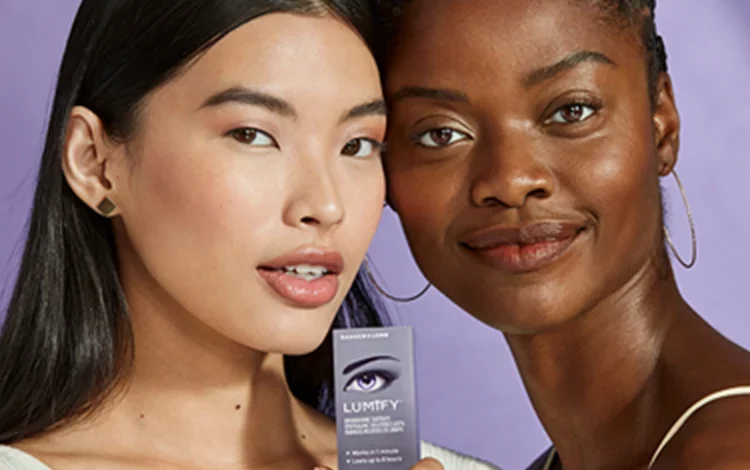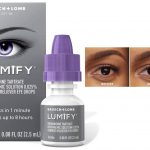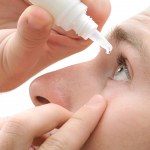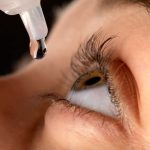Side Effects Of Lumify Eye Drops and Who Should Avoid Them

Lumify eye drops contain the active ingredient brimonidine tartrate, which is a selective alpha-2 adrenergic receptor agonist. It works by constricting the blood vessels in the eye, which reduces the redness in the eye.
The redness of the eye is caused by the dilation (widening) of blood vessels in the eye. This dilation is a natural response to various factors such as allergies, infections, or irritants. However, Lumify eye drops help to alleviate the redness by constricting the blood vessels in the eye, which reduces the amount of blood flow and thus the redness.
When applied to the eye, Lumify eye drops are absorbed into the bloodstream and travel to the blood vessels in the eye. The brimonidine tartrate in the drops activates the alpha-2 adrenergic receptors in the blood vessels, causing them to constrict. As a result, the amount of blood flowing through the blood vessels decreases, reducing the redness in the eye.
Lumify eye drops start working within 1 minute of application and can last for up to 8 hours. They are usually applied to the affected eye(s) once daily, as directed by a doctor or pharmacist.
It is important to note that Lumify eye drops are designed to alleviate the redness in the eye and do not treat the underlying cause of the redness. In this article, we will discuss in detail the most common and severe side effects of Lumify eye drops and who should avoid them.
Side Effects Of Lumify Eye Drops
The most common and severe side effects of Lumify eye drops.
Common Side Effects
Eye Irritation or Itching: Some people may experience irritation or itching in their eyes after using Lumify eye drops. This is usually a mild and temporary side effect that goes away on its own within a few minutes.
Eye Dryness or Watering: Lumify eye drops can cause dryness or watering of the eyes, especially if used for an extended period of time. This can be relieved by using artificial tears or other lubricating eye drops.
Blurred Vision: Lumify eye drops can cause blurred vision, which usually resolves within a few minutes after using the drops. However, if the blurred vision persists or becomes more severe, it is important to consult with your doctor.
Headache: Some people may experience a headache after using Lumify eye drops. This is usually a mild and temporary side effect that goes away on its own within a few minutes.
Foreign Body Sensation in the Eye: Lumify eye drops can cause a feeling of having something in your eye. This is usually a mild and temporary side effect that goes away on its own within a few minutes.
Eye Pain or Discomfort: Lumify eye drops can cause mild pain or discomfort in the eyes. This is usually a temporary side effect that goes away on its own within a few minutes.
Eye Redness: While Lumify eye drops are designed to relieve eye redness, they can cause temporary redness if used for an extended period of time.
Severe Side Effects
Allergic Reactions: Some people may be allergic to Lumify eye drops or the preservatives used in them. Symptoms of an allergic reaction may include swelling of the face, lips, tongue, or throat, difficulty breathing, and hives. If you experience any of these symptoms, stop using Lumify eye drops immediately and seek medical attention.
Increase in Blood Pressure: Lumify eye drops can increase blood pressure, especially if used for an extended period of time. This is more common in people with a history of high blood pressure or other cardiovascular problems. If you experience an increase in blood pressure, contact your doctor immediately.
Eye Infections: Lumify eye drops can increase the risk of eye infections if used improperly or for an extended period of time. Symptoms of an eye infection may include redness, discharge, pain, and sensitivity to light. If you experience any of these symptoms, stop using Lumify eye drops and seek medical attention.
Vision Changes: In rare cases, Lumify eye drops can cause changes in vision, such as double vision or reduced vision. If you experience any changes in your vision after using Lumify eye drops, stop using the drops immediately and seek medical attention.
It is important to note that these side effects are rare and that Lumify eye drops are generally considered safe when used as directed. If you experience any of these side effects, it is important to consult with your doctor to determine the best course of action. Additionally, always read the label and follow the instructions provided by your healthcare provider.
Who should not use Lumify eye drops?
Lumify eye drops are generally considered safe for most people to use. However, there are some groups of people who should not use Lumify eye drops or should use them with caution. These include:
1. Children under the age of 5: Lumify eye drops have not been studied in children under the age of 5, so their safety and effectiveness in this age group are not known.
2. Pregnant or breastfeeding women: The safety of Lumify eye drops during pregnancy or breastfeeding has not been established. Therefore, it is recommended to consult with a doctor before using Lumify eye drops during pregnancy or while breastfeeding.
3. People with a history of eye infections or eye surgery: Lumify eye drops can increase the risk of eye infections, especially if used improperly or for an extended period of time. People with a history of eye infections or eye surgery should use Lumify eye drops with caution and under the supervision of a doctor.
4. People with cardiovascular disease: Lumify eye drops can increase blood pressure, especially if used for an extended period of time. People with cardiovascular disease should use Lumify eye drops with caution and under the supervision of a doctor.
5. People who are taking certain medications: Lumify eye drops may interact with some medications, including prescription and over-the-counter drugs. It is important to inform your doctor or pharmacist of all medications you are currently taking before using Lumify eye drops.
6. People with allergies or hypersensitivity: People who have had a previous allergic reaction to Lumify eye drops or any of its components should not use Lumify eye drops.
7. People with narrow-angle glaucoma: Lumify eye drops are not recommended for people with narrow-angle glaucoma, as they can increase pressure in the eye.
It is important to always read the label and follow the instructions provided by your healthcare provider. If you have any questions or concerns about using Lumify eye drops, it is recommended to consult with your doctor or pharmacist.





